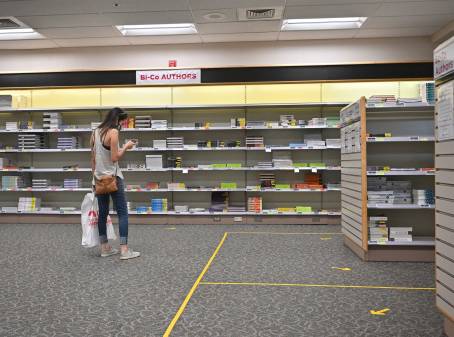Digital instructional materials, OER rising in preK-12 classrooms

The instructional materials market is a shifting landscape affected by trends in social-emotional learning, career-ready education and economic factors. In a recent webinar hosted by edWeb.net and presented by Kathy Mickey, a senior analyst at the market research firm Simba Information, she outlined the details of these changes.
Mickey reviewed the findings of a recent report from her company that compares and analyzes instructional materials available today and the market movements of the companies that are producing them.
Whole-course curriculums, also known as basal products, are expected to remain one of the largest selling products, she said. Rather than a single book or set of books, most basal programs now include a number of materials to facilitate learning. And even if the main product is print, the additional resources often include digital components.
Supplemental materials come in a variety of formats, as well. More important, Mickey said, teachers are stringing together groups of supplemental resources to create their own curricula. This includes teachers sharing lessons with each other within and outside of their districts. In addition, the number of schools and districts using open educational resources, online resources that are free of cost or copyright, continues to rise.
Regarding the digital shift, English language arts and literacy materials are still mainly in print form, but with digital supplements. Additionally, there’s a growing emphasis on ensuring students are reading at the proper grade level by third grade, Mickey said, which has driven schools to seek elementary materials that focus on phonics.
Math and science, on the other hand, are more likely to be digital, she said. Political issues such as climate change has prompted science or social studies teachers to often pull together their own materials.
While not necessarily in high volume, there are some other instructional areas gaining ground in digital formats, including the sciences, civics, career and technical education,and social-emotional learning, or SEL. Mickey said that there have been bursts of interest in SEL programs in the past, but she thinks their longevity depends on integrating them with other subjects rather than as stand-alone materials.
No matter what the subject, though, every publisher should be ready to share their student data privacy standards for their digital tools, Mickey said.
State policies can influence materials adoption, as well. Previously, about half of the students in the United States were in adoption states, states that officially adopt specific materials for various subjects and grade levels. But the number of pure adoption states has decreased. Many states may still review materials, but even then schools have discretion. The populous California, Texas, and Florida are still adoption states.
In addition to statewide adoption, many states not have regional consortia. Mickey said she’s heard principals tell publishers not to email them if they don’t already have a relationship with the school. Instead, publishers need to contact the consortium and start there.
Of course, states are investing in technology devices and infrastructure, but also in data-driven learning. This means that when administrators make purchasing decisions, their goal is to get materials to facilitate learning for all students and their individualized education needs. A key driver in those purchasing decisions can come from classroom data, said Mickey, as teachers provide information to show them what materials the students need.
About the presenter
Kathy Mickey is senior analyst and managing editor of the education group at Simba Information, where she leads research on the preK-12 and college education markets. Kathy writes the bi-weekly B2B business intelligence newsletter Educational Marketer and works on a number of annual market forecast reports. She joined Simba Information in 2000 after many years as a reporter and editor at weekly and daily newspapers, where her focus was education.
Join the community
EdFocus: The Edtech Industry Community is a free professional learning community on edWeb.net that will help you connect with colleagues in the education industry to share information and resources, raise questions, and get advice.
The edWeb webinar referenced above, sponsored by Simba Information, a business of MarketResearch.com, can be found here.




